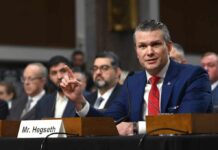
A heated exchange between CNN anchor Brianna Keilar and attorney Julie Hamill exposes the growing tension around transgender athletes in female sports as President Trump threatens to withhold federal funding from California.
At a Glance
- California high school transgender athlete AB Hernandez’s success in track and field competitions has sparked national debate
- President Trump threatened to withhold federal funding from California, citing violations of his executive order on transgender athletes
- Attorney Julie Hamill argued for biological sex-based competition while CNN’s Brianna Keilar consistently used female pronouns for Hernandez
- The debate centers on Title IX interpretation and whether transgender participation violates protections for female sports
- California’s law allows students to compete according to their gender identity, conflicting with the Trump administration’s position
Clash of Perspectives on CNN
The national debate over transgender athletes’ participation in high school sports intensified during a recent CNN segment featuring California attorney Julie Hamill and anchor Brianna Keilar. Their discussion centered on the case of AB Hernandez, a transgender athlete who excelled in jumping events at the California state championships. The exchange quickly highlighted fundamental disagreements about gender identity, sports fairness, and legal compliance with Title IX, the federal law prohibiting sex-based discrimination in education.
Throughout the interview, Keilar consistently referred to Hernandez using female pronouns, prompting Hamill to challenge the characterization. When Keilar asked what would make competition fair “for her,” Hamill responded pointedly: “Who is ‘her’? AB Hernandez is a male who identifies as a female. What would be fair is to have Hernandez competing in the male category. It is not fair for the females competing to have to compete with a male.”
Federal Funding at Stake
The controversy gained national attention after President Donald Trump threatened to withhold federal funding from California, claiming the state violated his executive order regarding transgender athletes in sports. The Trump administration maintains that allowing transgender girls to compete in girls’ sports directly violates Title IX protections. Hamill defended this position, explaining that schools not complying with Title IX are legally ineligible for federal funds.
When Keilar suggested that withdrawing funds might harm all student-athletes, Hamill countered that California has a straightforward path to maintaining funding: comply with federal law. This exchange highlighted the potential financial consequences facing states that maintain policies allowing transgender students to compete according to their gender identity rather than biological sex. California Governor Gavin Newsom has acknowledged the situation as “deeply unfair” but stands by the state’s current policy.
Science and Fairness in Competition
The debate over fairness in athletics took another turn when Keilar claimed the science on males competing against females in sports is not yet clear, suggesting more research might help resolve the issue. Hamill strongly rejected this premise, arguing that biological differences between males and females create inherent competitive advantages that compromise fairness in women’s sports. To address these concerns, the California Interscholastic Federation reportedly piloted a rule allowing additional female athletes to compete in finals when transgender participants are involved.
Hamill proposed alternative solutions, including having transgender athletes compete in categories matching their biological sex or creating separate competition categories. Coach Keinan Briggs, while acknowledging the need for fairness, opposed using federal funding as leverage in the debate. The exchange illustrated the challenge of developing policies that respect gender identity while maintaining competitive equity for female athletes protected under Title IX.
Beyond Sports: Broader Concerns
The conversation extended beyond athletics when Hamill raised concerns about medical interventions for transgender youth. “Pediatric sex-change procedures are very harmful and they cause life-long damage to children,” Hamill stated, advocating for more open discussion without accusations of bigotry. She emphasized that protecting both female sports opportunities and vulnerable young people requires honest conversation about biological realities and the potential consequences of early medical interventions.
As this national debate continues, the intersection of gender identity, federal education policy, and athletic competition remains contentious. The Hernandez case represents just one example of how schools, states, and the federal government struggle to balance inclusive policies with competitive fairness in sports. With federal funding potentially at stake, California may soon face difficult choices about its current approach to transgender athlete participation.

























